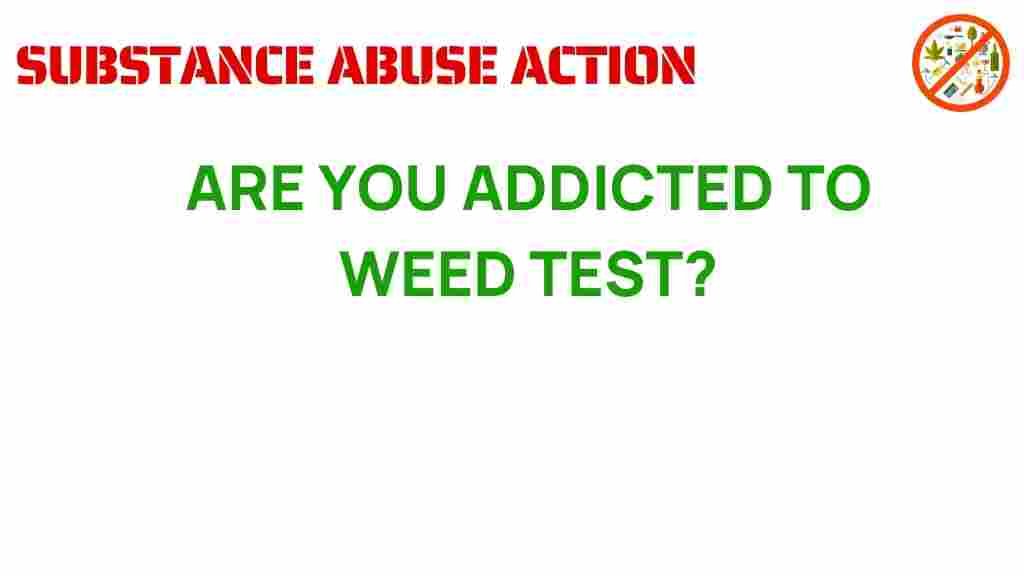Are You Addicted to Weed? Discover the Signs and Solutions
As cannabis use becomes more prevalent and accepted, understanding the potential for weed addiction has never been more critical. While many people use cannabis recreationally or for its medicinal properties, some may find themselves developing a dependency. This article will explore the signs of addiction, recovery options, and strategies to support mental health and well-being.
Understanding Weed Addiction and Cannabis Dependency
Weed addiction or cannabis dependency occurs when a person feels unable to control their use of cannabis, despite experiencing negative consequences. It’s essential to recognize that not everyone who uses cannabis will develop an addiction, but for some, it can become a significant issue.
Signs of Addiction
<pIdentifying the signs of addiction is the first step toward recovery. Here are some common indicators that may suggest a problem with cannabis use:
- Increased Tolerance: Needing to consume more cannabis to achieve the same effects.
- Withdrawal Symptoms: Experiencing irritability, insomnia, or anxiety when not using cannabis.
- Neglecting Responsibilities: Failing to fulfill obligations at work, school, or home due to cannabis use.
- Social Isolation: Preferring to spend time using cannabis over engaging with friends and family.
- Continued Use Despite Consequences: Persisting in use despite health problems or legal issues.
- Craving: Having a strong desire or urge to use cannabis.
If you recognize these signs in yourself or someone you know, it’s essential to take them seriously.
Impact on Mental Health
Understanding the correlation between substance use and mental health is crucial. Cannabis can affect brain chemistry, and habitual use may lead to or exacerbate mental health issues such as:
- Anxiety Disorders
- Depression
- Psychosis
- Increased Stress Levels
For individuals with pre-existing mental health conditions, using cannabis can complicate treatment and recovery. It’s vital to seek professional help if you suspect that your cannabis use is impacting your mental health.
Recovery Options
Recovering from weed addiction is a personal journey that often requires support. Here are some effective treatment strategies and recovery options:
1. Professional Counseling
Seeking help from a mental health professional who specializes in substance use can provide valuable insights and coping strategies. Therapies such as Cognitive Behavioral Therapy (CBT) can be particularly effective.
2. Support Groups
Joining a support group can create a sense of community. Organizations like Marijuana Anonymous offer resources and meetings that help individuals share their experiences and support one another.
3. Lifestyle Changes
Adopting healthier habits can significantly contribute to recovery:
- Regular Exercise: Physical activity can boost mood and reduce cravings.
- Healthy Eating: A balanced diet supports overall well-being.
- Mindfulness Practices: Techniques such as meditation can help manage stress and improve focus.
4. Medication
In some cases, medications may be prescribed to help manage withdrawal symptoms or underlying mental health issues. Always consult with a healthcare provider before considering medication.
Troubleshooting Tips
If you find yourself struggling with cannabis dependency, here are some troubleshooting tips to help you regain control:
- Set Clear Goals: Define what you want to achieve regarding your cannabis use.
- Track Your Use: Keeping a journal can help you identify triggers and patterns in your usage.
- Find Alternatives: Engage in activities that do not involve substance use, such as hobbies or sports.
- Stay Connected: Reach out to friends or family for support.
Support Resources
Accessing the right support resources is vital for recovery. Consider the following:
- National Institute on Drug Abuse – Provides comprehensive information on marijuana.
- Alcoholics Anonymous – While focused on alcohol, many resources apply to various substance use issues.
- Local Treatment Centers: Research nearby facilities that offer specialized cannabis recovery programs.
Conclusion
Recognizing the signs of weed addiction is crucial for anyone who may be struggling with cannabis dependency. Understanding the impact on mental health and exploring various treatment strategies can pave the way for recovery. If you or someone you know is facing challenges with cannabis use, it’s essential to seek help. Remember that recovery is a journey, and numerous resources are available to support you every step of the way.
Embrace the process of healing, and take the necessary steps toward a healthier, more balanced life.
This article is in the category Addiction and created by SubstanceAbuseAction Team
